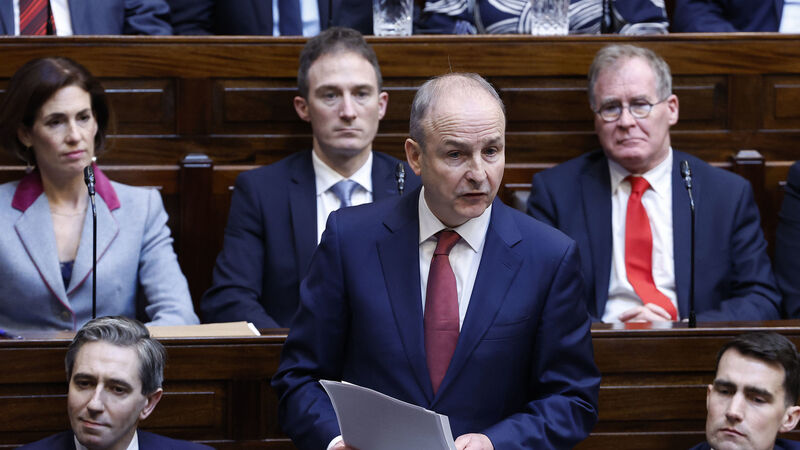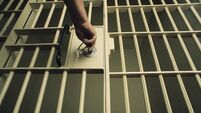First day in Dáil like 'the first day in secondary school'

Taoiseach Micheal Martin gives his inaugural address to the 34th Dáil after his election in January. PA Photo. Picture: Maxwell's/PA Wire
“My first day in the Dáil was a wonderfully joyful occasion,” says Taoiseach Micheál Martin. “My late father and mother, Paddy and Lana, both came up, the family, friends, a lot of canvassers, we had more people than were allowed, so we just had to keep on trying to use every mechanism and manoeuvre we could to get people in.
“Not everyone could get in to the visitors’ gallery but they were all over Leinster House, in the restaurant, in cubbyholes and everything else, they had a great day.
“All I remember is ushers saying to me ‘Jesus, you’ve people all over the place’.”
A member of Cork City Council since 1985, Mr Martin had first stood for the Dáil in 1987 and failed to be elected.
Two years later, Charles Haughey decided to call a snap election after his minority government lost a private members’ vote on the provision of a trust fund for haemophiliacs infected with HIV through contaminated blood supplied by the health service.
At that time, Mr Martin notes, private members’ votes were taken a lot more seriously than they are today, and the election presented the young Turner’s Cross councillor with a decision.
“I had got engaged in January, 1989, so I had a choice to make personally whether I’d run or not, and I obviously wanted to run to keep my name in the hat for the future, but I didn’t actually think I’d get elected in ’89.”
The party ran the same ticket as 1987, with TDs Batt O’Keeffe and John Dennehy again joined by Mr Martin and Barry Cogan, and a strong campaign saw Mr Martin elected.
Part of the extended Martin entourage on that first day was his nephew Pádraig junior, infant son of the new TD’s twin brother Pádraig.
“He was the only member of the younger generation at the time, we’re many, many nephews and nieces and first cousins later now, but he was the first to get into Leinster House with me. He was a very young baby, I remember there was constant vigilance on the nappy question.”
Mr Martin’s then fiancé Mary O’Shea was working in Fianna Fáil headquarters at the time, and he was on the party’s national executive, meaning they were both familiar with Leinster House, but he says he has never forgotten signing for the first time the formal register of elected TDs.
“Now, as a keen student of history, and I would have a tremendous sense of history, I considered it a great honour, as I was conscious of the honour that was bestowed upon me, because I was fascinated with Irish independence, the first Dáil, the second Dáil, the third Dáil, I did a thesis on the whole period of 1918 to 1932 involving Cork politics,” he says.
“I was very, very conscious of all that and considered it a great honour, and undertook to, whenever I could, and with the greatest dignity I could, to always respect the office and always respect the position. I’ve always been a passionate parliamentarian ever since.”
He offers a substantial postscript, recalling his role in the formation of the historic coalition formed between Fianna Fáil and the Progressive Democrats (PDs) in the wake of the 1989 general election.
“He actually lost some seats and the Progressive Democrats did well, and I remember getting a phone call from Charles Haughey [asking] did I know and could I talk to Pearse Wyse and others.”
Mr Wyse, a former Fianna Fáil lord mayor of Cork first elected to the Dáil in 1965 in the then Cork Borough constituency and an opponent of Mr Haughey, had joined the PDs in 1986, and had held his seat in 1987 and 1989.
Paddy Martin advised his son that a good man to talk to Mr Wyse would be Cork South-West TD Joe Walsh, a senior Fianna Fáil member in Cork who would later that year serve as minister for food and, in future governments, as minister for agriculture. The call was made, and Mr Martin recalls smiling a couple of weeks later at a piece of political gossip.
“Joe was seen coming out of a back door in PD headquarters, and he became one of the mediators in the formation of that government. I was chuffed with that.
“Máirín Quill was elected [for the PDs in Cork North Central] to that Dáil as well. We all became very friendly afterwards, even though things were tense at the time.”
At his first ever parliamentary party meeting, the Cork South Central TD spoke passionately in favour of a coalition government, arguing that Fianna Fáil had always moved with the times and couldn’t be wedded to a ‘no coalitions’ core value.
“A lot of people were against going into coalition, but I said ‘we owe it to the country to form a government’, and that has always been my mantra, right up to the present day.
“You have to deal with the election result as it is and you have an obligation to try and put a government together, particularly if you have the largest number of seats.”
It became the first Fianna Fáil coalition government.
“I remember some older people who were against it saying ‘who’s this young upstart pontificating about the need to go into government?’. At that time I was 29.”
In 1991, there was a reshuffle and speculation was rife that Mr Martin was going to be made a minister, something he says he didn’t believe would happen then. (Any ministerial ambitions he had would have to wait until 1997, when Bertie Ahern would appoint him to the Department of Education.)
“Haughey actually apologised to me afterward for not appointing me, he brought me up to the office, and I was saying ‘what are you apologising for?’,” he says. “I later became lord mayor of Cork in 1992, which was far more [important] to us, we were thrilled with that, that was the best year of our life.”
Simon Harris:
First elected to the Dáil in 2011, when he was 24, Tánaiste Simon Harris describes as “pretty nerve-racking” his first day as a TD, when he had to make a maiden speech which was unlike most.
“Enda Kenny, who was about to become taoiseach, rang me, and he said to me: ‘Dear Simon, unto you, as the youngest TD, does the honour fall to nominate me to be taoiseach!’
“Usually, people give their maiden speech a couple of weeks into their time in the Dáil, and often on a relatively minor matter, to ease yourself in a bit, but I was thrown into the full Dáil chamber, packed press gallery, packed, live television, and I had to nominate Enda as taoiseach,” he remembers.
Before Mr Kenny was elected leader of the country, the outgoing taoiseach, Brian Cowen — “a decent person whom I very much admire as a human being” — had not sought re-election but as tradition dictates, he sat in the taoiseach’s chair.
This meant that, for some 30 minutes, Fine Gael sat on the opposition benches, the only time — “so far,” Mr Harris notes — the Greystones TD has ever been in opposition.
“The clip has made Reeling in the Years now, and every time I look at it I go ‘How the hell did anyone let me out of the house like that?’ I clearly hadn’t found a hair brush or hair product,” he says, adding wryly that he hadn’t any grey hair back then either.
Mary Lou McDonald:
Having previously served as an MEP in the cavernous European Parliament chamber, Sinn Féin leader Mary Lou McDonald was first elected to the Dáil in 2011, and she remembers being struck by just how small our national parliamentary chamber is.
“Like, you could nearly touch someone across the chamber if you had long arms and you were having a barney with them,” she says.
Sinn Féin enjoyed a good election that year, she remembers, returning what she says was a strong team.
“It was a mixture of excitement, apprehension, a real sense of the responsibility, and it was also great craic,” she says.
“My kids were very young at the time, and they loved the novelty of being here in the big house and what was going on, so, yeah, a proud day, but excited, and nervous too.
“That was a great day, I remember, a great day.”
Ivana Bacik:
Labour Party leader Ivana Bacik points out that she has had two first days in Leinster House, being first elected to Seanad Éireann in 2007, and being elected a TD for Dublin Bay South in 2021.
“My abiding memory of that first, first day is being heavily pregnant with my second daughter and trying to find a toilet,” she remembers.
“I was one of very few women elected while expecting a baby, but it was a very exciting time and I was thrilled, it was a very happy and joyous day, but I was also quite physically aware of my condition.” Her younger daughter is now 17, she says.
“My second first day, in July 2021, when I was first elected to Dáil Éireann in a by-election, that was again very memorable, not just because of being a new TD, and that incredible honour, but because it was the height of covid.
“We were in the Convention Centre, which is utterly soulless, so it was all very peculiar, and because it was a by-election I was the only newbie,” she says.
“It was a very bizarre experience, fully masked and very muffled.
“I’m just so thrilled to have been re-elected in November. A very wise senior figure in Labour said to me ‘It’s an honour to be elected, but it’s a much bigger honour to be re-elected’.”
Michael Collins:
Independent Ireland leader Michael Collins was a busy undertaker and county councillor when he stood for election to the Dáil in Cork South West in 2016 and he wasn’t sure he would be elected.
“It’s up to the public, and you just don’t know. I was canvassing in Rosscarberry the week before that election. and this lady didn’t know me at all, and she said: ‘What do you do for a living?’ and I stopped for a while and I said: ‘Next week, girl, I could be heading for Dáil Éireann or I could be looking after the dead, it’s one or the other’.”
He says that, despite that huge change, he was very focused on delivering for his constituency.
“While I did enter discussions that first time to form a government, I know pretty soon that it was placed for me to be in opposition for the greater good of people in West Cork initially, because prior to that we had three government TDs and people felt they were let down badly.
“I wanted to deliver for the people as a voice of the people, an opposition voice of the people,” he adds.
Holly Cairns:
In February, 2020, when Holly Cairns first came through the gates of Leinster House as a TD for Cork South West, she was overheard to ask: “Is this really happening?” She had only been elected to Cork County Council for the Bantry-West Cork local electoral area the previous June, winning the last seat by a single vote, after several rechecks and a recount.
Leader of the Social Democrats since 2023, Ms Cairns is currently on maternity leave. That morning five years ago, she told Stephanie Rohan of Oireachtas TV that her short journey to Dáil Éireann had been “a rollercoaster”.
She said she had brought her grandparents with her that day, as well as her mum and her cousin Poppy, adding an observation that many new parliamentarians have made, that the first day in Leinster House felt like starting in a new school.
Holly Cairns’s Dáil election had seen her break Fine Gael’s 59-year hold on a seat in Cork South-West, but she saw that as only the beginning.
“Unfortunately, I’m the only female TD elected in Cork county, so I think that goes to show we have a lot of work to do,” she noted, work which, as it turned out, would remain as yet unfinished in the November 2024 general election.
Arriving at Leinster House can be intimidating for the new TD
Crossing Kildare Street and walking through the gates of the national parliament as an elected member is an experience few enough people will ever get to know, but what must it feel like?
“The best analogy I’ve ever come across compares it to the first day in secondary school,” says broadcaster and journalist Gavan Reilly.
The political correspondent for Virgin Media News and a regular presenter of The Tonight Show, he has literally written the book on the subject of Ireland’s national parliament, The Secret Life of Leinster House.
Given that most parliamentarians learn their trade as local councillors, he says, they usually feel a certain discombobulation to be in what can feel like political big school.
“In most cases, you were in the same primary school for seven or eight or nine years beforehand, so you feel like you know the entire place, not only do you know where the staff room is, there’s a fair chance you’ve been in the staff room a few times and you even know where things are, even in the rooms that you don’t go to, you still have this innate familiarity with all of it,” he says.
“And you go to the next place and you think a lot of it is going to be transferrable, and actually very little of your previous experience truly carries over.”
Perhaps the ability to interact with people is the same, regardless of whether you work in a local authority or the national parliament, he suggests, but the nature of the work is very different.
“And the sheer physical size of the place can be quite intimidating as well.
“I met a prominent female TD in one of the underground corridors a couple of summers ago, and it was her first time realising that there was an underground passageway that led from the proper Leinster House to some of the multi-storey extensions where some of the offices are.”
He adds that, despite being a TD of several years’ standing, she had not known that she did not have to brave the elements each time she moved between the various extensions, getting her hair blown every direction in the wind and the rain.
That unfamiliarity with the parliamentary building in itself is quite common, he notes.
“It maybe a slightly superficial example of the transformation, but I think it neatly illustrates how byzantine not alone the complex can be, but also the customs, the formalities, the written rules, the unwritten rules, the general procedures and protocols that operate the whole thing.
“The things that no-one ever gives you a handbook about, and I think that’s the biggest challenge that people find in Leinster House,” he says.







 App?
App?


